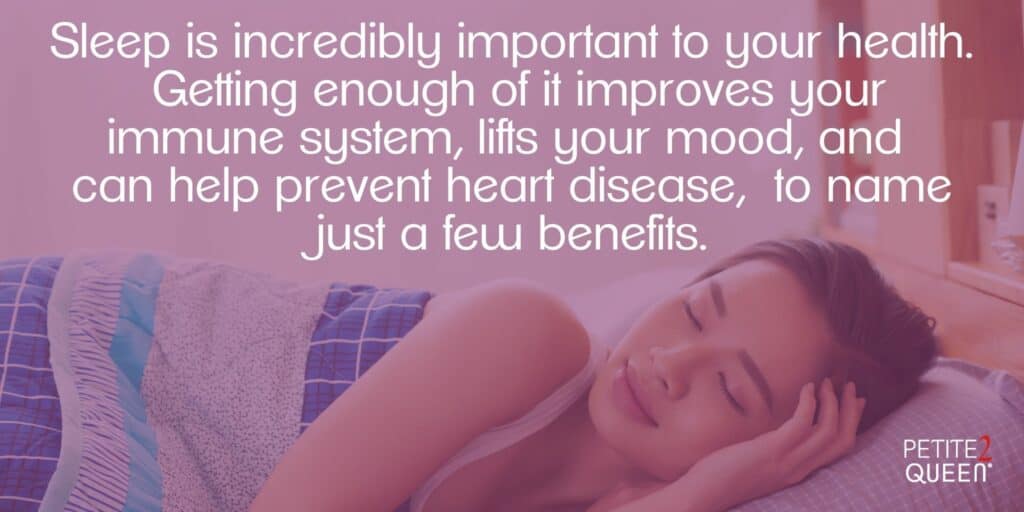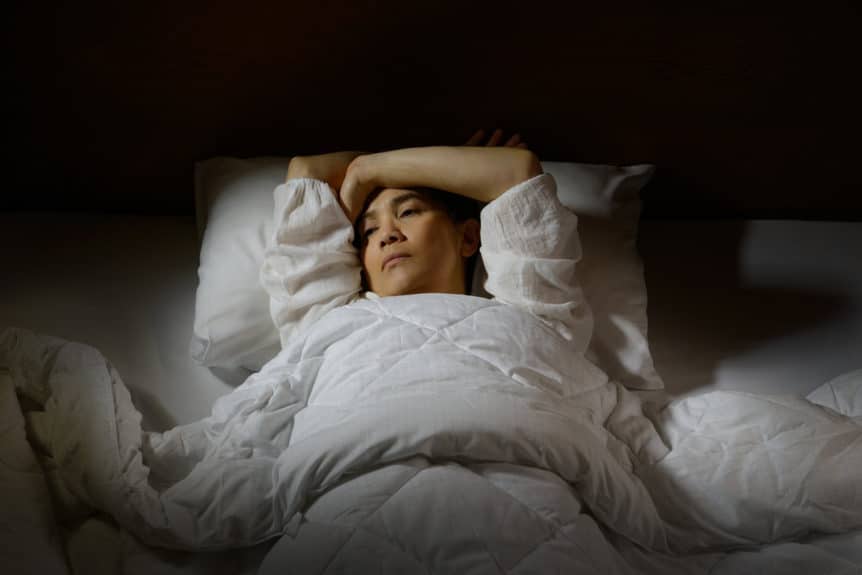Sleep is incredibly important to your health. Getting enough of it improves your immune system, lifts your mood, and can help prevent heart disease, just to name a few benefits. Getting too little sleep, however, increases your chance of accident and injury, makes you irritable, and, if chronic, can lead to some serious health conditions. If sleep comes easy for you, it’s natural to take it for granted. If, however, you experience insomnia occasionally or frequently, you should seek out ways to improve your rest. Lynn and Rachel are two members of Petite2Queen who have experienced long-term insomnia. Here’s how they fought back.
Reorientation – How Lynn Combated Insomnia
Sleeping sideways has been a lifesaver for me in the last nine months. This might sound strange, but it’s true. 2017 was one of those perfect storm years with multiple tragedies I had to endure. In the last month of his life, my husband was home with hospice support. Our family room became his bedroom as his mobility was extremely limited. It was a hard time. I struggled to sleep at night, which is a very common and normal reaction to stress.
Given the situation, there was no way I was going to take sleep medication – I needed to be able to wake up quickly and fully if there was an emergency. Here I was, trying to sleep in our bed alone, worried, stressed, and nearing my wit’s end due to fatigue. There were a few things that helped soothe me, like opening my window to get the fresh breeze and playing my “calm mix” very low, but I was still lucky to get five hours of un-restful tossing and turning.
One night, after no luck sleeping, I decided to try sleeping sideways in the bed. I did not move the bed, the bed sheets, or most of the pillows. Moving only my pillow and my person, I lay sideways and fell asleep. It was my first good sleep in months. Continuing to sleep sideways helped me get the rest I needed to get through my husbands final illness, death, and grief. Like most people, getting a good night’s sleep has an enormously beneficial impact on my health and outlook.
Honestly, it seems weird to me that something so simple as sleeping sideways in my bed could make such a difference. But it did, and it still does. That basic shift in my pattern helped me move towards a new normal. Now, I had a king bed, so sleeping sideways was easy, but even with a queen or full-size bed you could get close to sideways. If you are having trouble sleeping, or are going through your own hard time, consider giving it a try. Nine months later, I will still sleep sideways when my mind is racing, I’m worried, or I’m stressed. It works every time.

Over- and Behind-the-Counter – How Rachel Combated Insomnia
I’ve had trouble sleeping for as long as I can remember. I recall that during high school it would take me nearly three hours to fall asleep at night, which seriously cut into the rest my teenage brain and body so dearly needed. Running on maybe five hours of sleep each day, I was perpetually tired.
Things got much worse when I got to college. Gradually, three hours grew into six or seven hours of waiting for sleep to come, bringing nights of tears and loneliness as I lay silently so as not to wake my roommates. I frequently took naps during the day, which brought my total daily sleep time to about two hours. This is not sustainable.
I turned to over-the-counter sleeping pills and NyQuil to bring sleep faster. It worked at first, but I found that I would build up a tolerance to the medication and need to increase the dosage. After a few months of this, I grew nervous that my use of sleep aids was getting dangerous, so I stopped. This also meant I once again stopped sleeping more than a couple hours each day.
Besides medicine, I tried all sorts of “sleep hygiene” methods: having a consistent sleep schedule, turning off my computer and dimming the lights an hour before bedtime, reserving my bed as a space only for sleep (not eating, reading, etc.)… the list goes on. None of it worked.
Eventually, a panic attack led me to seek out a psychologist, as well as a psychiatrist. I was prescribed a medication to help me sleep, and it absolutely worked. For the first time in memory, I fell asleep within an hour and slept through the whole night. Today, I’m on a different medication, but I still need prescribed medicinal support to sleep; without it, there is no sleep. For me, it’s absolutely worth it. I get eight hours of sleep every night, which has seriously improved my mood and health.
Consistently getting too little sleep is seriously detrimental to a person’s mental and physical health. Lynn and Rachel dealt with their insomnia in ways that made sense for their situations, but these aren’t the only ways to find your way to restful sleep. Do some research and ask your pharmacist or doctor for help. Sweet dreams!
Resources
- Article: “How Much Sleep Do We Really Need? Recommended Sleep Times for Every Age”
- Article: “20 Tips to Fall Asleep Faster and Enjoy Better Sleep”
- Article: “10 Health Benefits of Quality Sleep”
- Article: “Insufficient Sleep: A Public Health Problem”
- Article: “The Most Sleep-Deprived Cities in the US”

Lynn Whitbeck is the co-founder and President of Petite2Queen. She is focused on identifying and evaluating opportunities for women at work, helping them define their personal roadmap. She dedicates herself to delivering tools and insights, embracing visualization of the big picture, and identifying and implementing the minutiae of detail. Lynn aims to share lessons learned along her journey and enable positive uplift for women.

